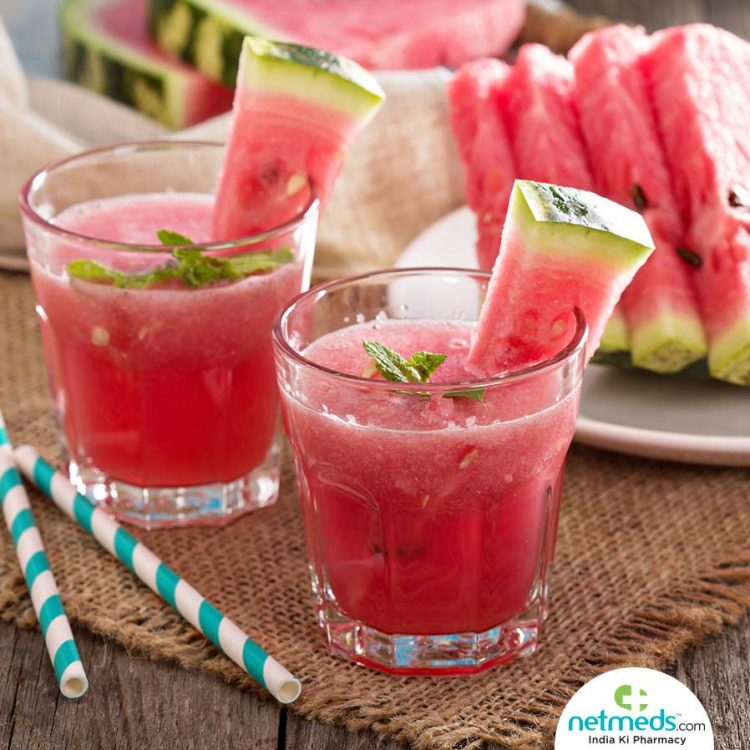Watermelon goes by the scientific name Citrullus lanatus, is referred as “Tarbooj” in Hindi, “Tormuj” in Bengali, “Pucchakaaya” in Telugu and “Tharpushni” in Tamil. It is a popular summer fruit used in the preparation of rejuvenating juices, punch, smoothies, fresh fruit salads and is also mildly spiced and added in wholesome sandwiches.
Although originating in West Africa, watermelons are cultivated in tropical and sub-tropical environments worldwide, including South-East Asian countries like China, India and Sri Lanka as well as parts of Southern Europe, USA and Australia.
The watermelon plant is a climber that grows up to a height of 3m. It branches into tendrils, from which large, green, pinnate (paired) leaves sprout, having a prominent rough texture. The flowers are five or six-petaled and usually white, cream or yellow in colour. On further developing, these pale flowers give rise to large fruits, which is basically a modified type of berry called a pepo. It has a thick, hard, green and white striped outer layer called the exocarp within which is the fleshy interior – the endocarp, that is bright pink or deep red with many tiny seeds known as pips.
The juicy watermelon fruits have a marvellous nutrient profile, being laden with abundant water content and powerful health-sustaining compounds. Being naturally low in calories, they provide ample amounts of vitamin C and vitamin A, as well as the vital trace minerals potassium and copper. Watermelons are also a rich source of the amino acid citrulline, which gets converted into arginine in the body and the potent antioxidant lycopene. Also Read: Vitamin A: Functions, Food Sources, Deficiency And Toxicity
The host of useful components intrinsically present in watermelons certainly confer several beneficial traits for human health, such as reducing high blood pressure levels, healing muscle aches and most importantly, hydrating the body. Nevertheless, one question commonly asked by many people is, if a watermelon is good for diabetes.
Is Watermelon Good For Diabetes?
Diabetes is a disorder that is characterized by high blood sugar or glucose levels. This occurs due to damaged beta cells in the pancreas, a gland located in the abdomen, that is responsible for secreting the hormone insulin, which regulates blood sugar concentrations. Once diabetes intensifies, it leads to many severe complications such as neuropathy, kidney failure and heart disease. Also Read: 4 Types Of Diabetic Neuropathy: Prevention And Treatment
Consuming a small portion of fresh-cut watermelons or a glass of juice extracted from the fruit can benefit those with type 2 diabetes in many ways. Although watermelons have a high glycemic index (GI) of 72, they have a relatively lower glycemic load (GL) of 2 per 100-gram serving. In addition, it is also low in carbohydrates and calories, thereby not contributing to excess fat accumulating in body tissues. This aids in maintaining optimal body weight, which is crucial to improve the quality of life for those with diabetes.
Furthermore, watermelon seeds, which people normally tend to discard, can, in fact, be crushed, powdered and consumed by diabetics. They are a powerhouse of nutrients including proteins, omega-3 and omega-6 fatty acids, vitamins, zinc and potassium. Various scientific studies have demonstrated the ability of these seeds to lower blood sugar levels and improve insulin resistance. However, they are high in calories, so be sure to take a measured spoonful of watermelon seed extracts.
In summary, it is advised to consume a well-balanced meal of a moderate portion of watermelons, which is a high GI, low GL fruit, with other low GI foods, to keep blood sugar levels in check, for those who have type 2 diabetes or prediabetes symptoms.
Added Health Benefits Of Watermelons:
The antioxidants and essential nutrients inherently contained in watermelons confer numerous therapeutic properties such as preventing cancer, improving heart function, replenishing body fluids when dehydrated, diminishing the risk of neurodegenerative disorders like Alzheimer’s disease and enhancing skin and hair health.
Hence, it is generally safe for diabetics to eat watermelon fruits, drink the juice and consume the seed extracts, in limited proportions. Always consult with your doctor or nutritionist, in order to find out the ideal way to add this juicy and tasty fruit to your low-sugar diet, based on the current status of blood sugar levels, to augment overall health.
Watermelon Nutrition
Watermelon is an incredible source of essential vitamins and minerals including:
- Vitamin A
- Vitamin C
- Vitamin B6
- Potassium
- Magnesium
- Iron
- Calcium
Vitamin A improves good vision and supports keeping the heart, kidneys, and lungs healthy, while packed with vitamin C it aids in augmenting heart health, averting cancers and fighting symptoms of a common cold. A natural source of dietary fibre, consuming watermelon can keep up satiated and promote gut health.
Being a natural source of sugar having watermelon in moderate amounts can curb your craving for sweets and keep you feeling full, as it contains over 90% water. Thus, adding this wonder fruit helps you stay hydrated, regulate sugar levels and aid in weight management.
Other Diabetes-Friendly Fruit
Though eating watermelon has its incentives, one should consider balancing the diet with fruits that are low in glycaemic index. Ensure to choose fresh fruit whenever and wherever possible, as it does not have any added sugars.
Fruit juices and dried fruits should be limited as they are:
- High in calories
- Loaded with sugar
Some of the other diabetes-friendly fruits with a low GI include:
- Plums
- Grapefruit
- Peaches
- Apricots
- Pears
- Berries
Source by www.netmeds.com




